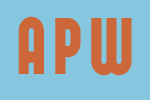APW Welcome

On the first day of a classroom poetry workshop, one might hear the sound of chairs scraping across the wooden floor -- the boards creak and tremble as students enter the room and shift the seating arrangement from orderly rows of a daytime math class into a new shape. This is much like the process of shaping a poem. Throbbing metal chair legs and vibrating feet make the desktops tremble; the noise clatters off the ceiling.
Because a writing workshop is a place of interchange and opening, I request that students face one another. We have a similar opportunity here -- the chance to look into ourselves as we look across to our neighbors who also write poems. We have the opportunity to look into each other; our fellow classmates' topics become our topics, their concerns become our concerns.
We also look beyond the circle to the world of image, rhythm, and metaphor expressed in vivid language. We reveal and revise our vague and ever-evolving feelings about our children, our friends, our history, and our public matters. We enter the world of each other.
What I hope to accomplish here is a rough resemblance to what one might find in a classroom workshop -- an open atmosphere for sharing our work with a receptive audience. Here you will also find a sampling of our reading lists, writing exercises, poets' resources, and have the opportunity for your poems to be scrutinized by your peers.
Once the chairs are settled in a circle, I ask that my students enter the class with a sense of courage, a willingness to trust, and a desire for community. I tell them that they must have courage to speak from their hearts, be willing to trust in one another, and be willing to risk making themselves vulnerable. My students must give their most honest responses and informed criticism to their classmates' opening drafts.
I also tell my students to have a willingness to listen to what others have to say about their work, even if they disagree -- take the comments which are useful, and discard the rest. As Richard Hugo used to tell his beginning creative writing classes, "At all times keep your crap detector on," and then quoting Yeats, Hugo reminds us that our most important arguments are with ourselves.
At all times keep your crap detector on.
-- Richard Hugo
As I enter my twenty-first year of teaching poetry, the readings and writing assignments I propose here are simply that: proposals. Hopefully, they will fit individual needs and yet remain somewhat flexible. If something works for you, fine, if something does not draw your attention, go on to something else.
As we draw our chairs into a circle here, please join your other beginning- and advanced-level peers, and look into yourself, look into the world, and then return with your most challenging and honest work.
Within these pages, it is my wish to bring to light the materials, ideas, and poets who otherwise may have escaped your notice. I hope to expand your understanding of, and alert your ears to the timeless possibilities of the written and spoken word.
Scott Reid
June, 2010